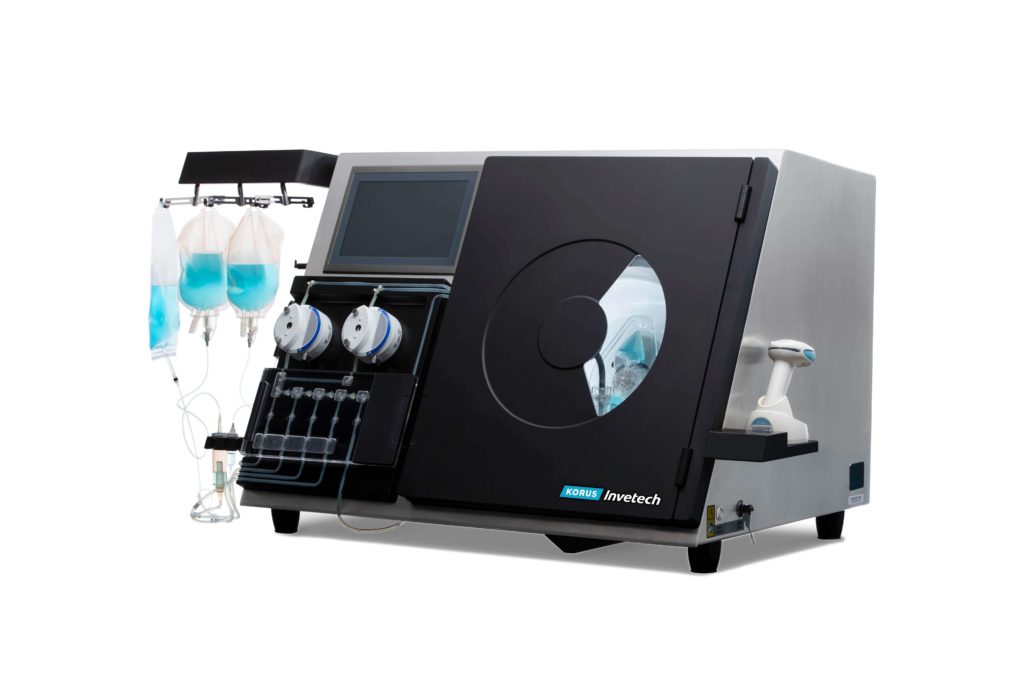My name is Tina Al-Attar, and I am an Applications Scientist at Invetech. I’ve been with Invetech for more than two years now, and I’ve been very happy to work with the cell therapy team and with our clients to develop autologous cell therapy protocols and systems.
It’s been great being part of Invetech; it has been a very exciting journey. Invetech has been working with the leaders of the cell and gene therapy industry since 2003. Invetech started with helping cell therapy developers design their own custom-made systems to meet their own specific applications. And very recently, we have been celebrating the launch of our new ready-to-run cell therapy system Korus™.
Korus is a counterflow centrifugation system, and it’s capable of performing cell elutriation, which is the separation of cells based on their size, shape and density. The system is also capable of performing cell concentration and cell washing.
Our data shows that Korus provides two and a half times more efficient overall manufacturing cell yield compared to regular cell washing. Let me give you an example here. Lymphocyte elutriation with Korus starts with loading up a full-size apheresis unit into one of the chambers. Then the elutriation takes place where the lymphocytes in this example get separated from other cell populations, such as monocytes. Then the lymphocyte population gets concentrated into a clean chamber and that gets harvested into a harvest bag.
Our data shows that there’s an improvement of 31% in the purity of the lymphocyte population that gets harvested, and there’s a 49% improvement in the recovery of T cells after the cell selection, which is a downstream process. There’s also 70% more growth of those T cells during expansion compared to cell washing. So, you can see that Korus provides a more efficient overall manufacturing process.
Korus was built with the cell therapy industry challenges in mind, so it’s set to address those challenges. And it does that by providing a very pure cell population as a result of its processes. And not only just pure cell populations, but also viable cell populations.
In fact, we saw that the difference or reduction in viability is less than 1% on average, so this provides a good product to start the downstream processing. And that’s by providing this high-quality product in a timely manner.
I will say time is a major challenge especially for patients who are waiting for their therapies and so manufacturing more cells in a timely manner is crucial for their survival. And that’s what drives our passion here at Invetech. That’s what we try to work so hard for, to try and make a difference.
Another challenge I can think of is the variability of the input material, and that is a main challenge in the cell therapy industry, especially for T cell-based therapies. For example, the input material that’s collected from patients can be up to 90% cancerous blasts. When those die, they leak DNA and this material is, we can say, sticky, so it traps those T cells – the healthy ones we want to harvest. And when they get trapped, we lose them during the downstream processing such as cell expansion or even cell washing due to clumps. So, providing a system that can be consistent and can eliminate that variability factor as much as possible and provide an improved processing overall, is essential.
Other challenges that come to mind, or issues especially after the pandemic, are issues with supply chain and cost of goods, and even difficulties in finding skilled specialists in the area, are all challenges that we have to keep in mind.
Cell therapy manufacturing is expensive and making technologies that can bring down that cost is essential. Systems that are built with such advanced technologies can be flexible, scalable, robust, automated and reliable.
Let’s take flexibility as an example here. Korus, for example, is built with that in mind. It provides one core technology that empowers the cell therapy developer to optimize their protocols and provide a smooth transition from process development to GMP manufacturing.
And then the other factors that I mentioned provided by technology and advancements in technologies also play a big role in providing high quality products in a timely manner. And that’s what can provide more therapies for more patients.
This interview was originally published by Phacilitate.
The Korus system is for research, laboratory or further manufacturing use only. It is not intended as a medical device in therapeutic or diagnostic procedures. Customers are responsible for validating the use of Korus within their process or therapy. Consult all instructions, terms and warnings prior to use of the solutions and products. Failure to do so can result in damage or serious injury, including death. Ready-to-run turnkey systems may require minor configuration before sale and use depending on customer needs.
